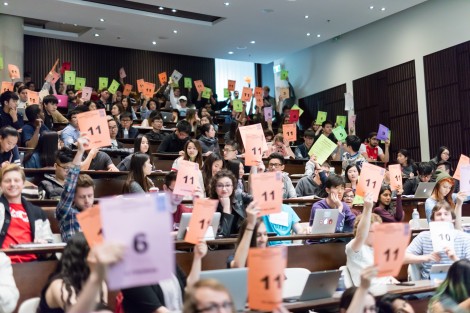Following a contentious general meeting on April 20, the University of Toronto Students’ Union (UTSU) election results were ratified with 681 votes in favour, 519 opposed, and 33 abstentions.
In accordance with the Canada Not-for-profit Corporations Act — the legislation that governs federally incorporated not-for-profit organizations — the UTSU is required to hold a general meeting open to its members, in order to ratify the results of its elections.
After the campaign period ended, every member of the 1UofT slate was disqualified for exceeding the maximum number of demerit points, due to a series of rulings made by the union’s chief returning officer (CRO) and the Elections and Referenda Committee (ERC). This included vice president, internal & services candidate Carina Zhang and physical & mathematical sciences director candidate Yidong David Fu, both of whom won their elections.
Many of these rulings related to non-English campaign material posted on social media without English translation. Under the Elections Procedure Code (EPC), non-English campaign materials are required to be accompanied by a notarized English translation.
Many members packed into an auditorium in the Bahen Centre to express concerns over the disqualifications and vote against the ratification. Some in attendance argued that voting against the ratification would put the union in jeopardy and implored fellow members to not throw out the results.
“I’ve heard people say that hundreds should not affect the decision of thousands. Then, how about a committee of four people affecting the decisions of thousands of voters because of their bias?” said 1UofT vice president, professional faculties candidate Charlotte Mengxi Shen during the meeting. Shen also criticized the EPC’s rules surrounding non-English campaign materials. “This rule is making elections inaccessible or less accessible for international students,” she said.
Andre Fast, 1UofT’s vice president, external candidate, had similar concerns.“We cannot have ERC meetings to give out demerit points without informing candidates so they can be present to defend themselves,” he told The Varsity. “We cannot issue candidates more than 30 demerit points solely for speaking their first language.”
“The UTSU bylaws are clear that if ratification had failed, the ERC would need to take immediate action to hold an election,” Fast continued. “In the meantime, the current executive would continue to operate the Union, meaning there would be no disruption to Union activities.”
During the meeting, outgoing UTSU president Ben Coleman served as chair for the meeting and explained that if the ratification motion failed, the current board of directors from UTSG would remain. Coleman noted that, under these circumstances, members could expect “a significant number of executives and directors” resigning or graduating.
According to Coleman, this would lead to a limited number of people governing the union and put many of the union’s operations over the summer, such as clubs funding and frosh week, at risk. “Governance at the UTSU would be severely undermined,” warned Coleman.
Although the UTSU’s bylaws say that the the ERC would have to take “immediate action,” Coleman did not interpret this to mean that an election would be called immediately, as no UTSU election can happen during the summer.
Following the ratification, the new executives and board of directors took office on April 30.



